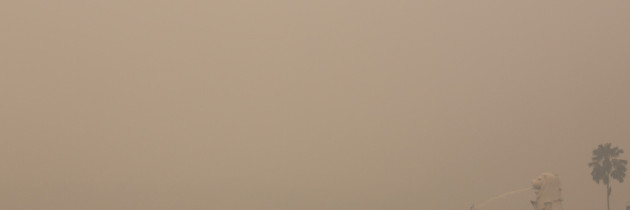RSPO members implicated in air pollution crisis, says Greenpeace
Companies which are part of the industry-led organisation specifically created to promote sustainable palm oil production have been implicated in the Indonesian forest fires which caused Asia’s worst air pollution crisisin decades.
Greenpeace has released maps which it says show fire hotspots in the Riau province of Sumatra on plantation land owned by subsidiaries of member companies of the Roundtable on Sustainable Palm Oil (RSPO). The companies include Jatim Jaya Perkasa – an alleged past offender which missed two deadlines to provide information to the RSPO, and palm oil giant the Sime Darby group – which the RSPO had cleared of wrongdoing earlier this week.
The RSPO “has failed to tackle its members’ role in creating the conditions that led to such a disaster, nor has it held companies accountable for the impact of their operations,” said Bustar Maitar, head of Greenpeace’s Indonesia forest campaign.
The fire hotspots are among over 9,000 detected in the Indonesian forestry and peat lands which contributed to the worst annual haze in the region since 1997. The smoke caused by the latest slash-and-burn land clearing drifted to neighbouring countries and caused respiratory health problems, shut schools and businesses, disrupted flights and sparked diplomatic tensions. The crisis has reportedly cost $9bn in economic productivity losses for Singapore and Malaysia.
After initially blaming foreign-owned plantation companies, the Indonesian president, Susilo Bambang Yudhoyono, offered a formal apology to Malaysia and Singapore, and took the Riau administration to task for its slow response. Indonesian authorities have since arrested at least 23 people for deliberately lighting fires in Sumatra, the Indonesian foreign minister, Marty Natalegawa, said.
Greenpeace said its information showed nearly 100 hotspots on Jatim Jaya Perkasa land, and more than 20 on plantation land owned by Bumireksa Nusasejati, part of the Malaysia-based Sime Darby group. However Sime Darby said the fires found were on areas not planted by staff but local farmers, and the company intended to increase awareness programs among the local community.
Jatim Jaya Perkasa was asked to provide information to the RSPO for investigation but missed two deadlines, prompting the RSPO to say it would initiate complaint proceedings. It then submitted the maps but in an unusable format.
The company was also found in 2003 by the World Wildlife Fund to have engaged in slash and burn land clearing. Guardian Australia tried contacting the company several times but no available contact details were current.
Greenpeace also named agriculture giant Wilmar International – the parent company of Australian sugar and biofuel producer Sucrogen – as a company with hotspots on its land, but did not provide further data. Wilmar has previously said it would cut ties with any suppliers found to be engaging in illegal land clearing.
Wilmar’s head of corporate social responsibility and sustainability, Jeremy Goon, confirmed “categorically” to Guardian Australia that the company had a strict policy on no burning, and would cut ties with suppliers who did it.
“We also have had daily fire monitoring on all of our locations and areas for the last six years and again can categorically state we have no fires on our plantations,” Goon said.
“When I received the fire report yesterday there was again nothing of note.”
Greenpeace has since been contacted for further comment and clarification on the allegations.
Greenpeace said its investigation pointed to a wider problem among the industry which is being ignored by the RSPO, which only investigated member companies who had been named in the media, not all member companies in the Sumatran region.
“Rather than claiming the innocence of members who’ve been reported in the media, the RSPO needs to address the real problem – years of peatland drainage and destruction which is labelled ‘sustainable’ under RSPO rules and has laid the foundation for these disastrous fires,” said Maitar.
The RSPO announced this week that it had investigated and cleared four of its five member companies who were reportedly implicated in the Indonesian forest fires, however it added that, “the analysis has been carried out solely on the concessions that the RSPO has specifically requested”.
It had earlier said that the first three companies to be cleared had had no hot spots identified within their plantations. “There were, however, a few hot spots present in a minority of the areas,” it said. “These hotspots were correctly managed by the respective companies and were extinguished within 24 hours from their appearance.”
The RSPO described these plantations as apparent “safe havens” when compared with “rampant hot spots” in areas nearby.
It added that the maps of concession areas publicly available from Indonesia’s forestry ministry and other agencies differed to the current maps supplied by the five members.
“Further clarification is therefore needed from these agencies about the precise concession boundaries,” it said.
The illegal slashing-and-burning conducted by farmers and plantation companies in the Sumatran forests and peatlands is a cheap way to clear land for agricultural use. WWF claimed nearly 40% of the more than 9,000 detected hotspots mapped by Nasa satellites overlapped with large-scale pulpwood concessions or oil palm plantations.
The production of palm oil – which is in at least 50% of products on supermarket shelves – is a contentious and high-profile environmental and consumer issue. Activists lay the blame for the near-extinction of the Sumatran orangutan on destruction of their habitat, much of it for palm oil plantations, and recent research suggested it may be also a big contributor to climate change.
Fonte: guardian.co.uk



